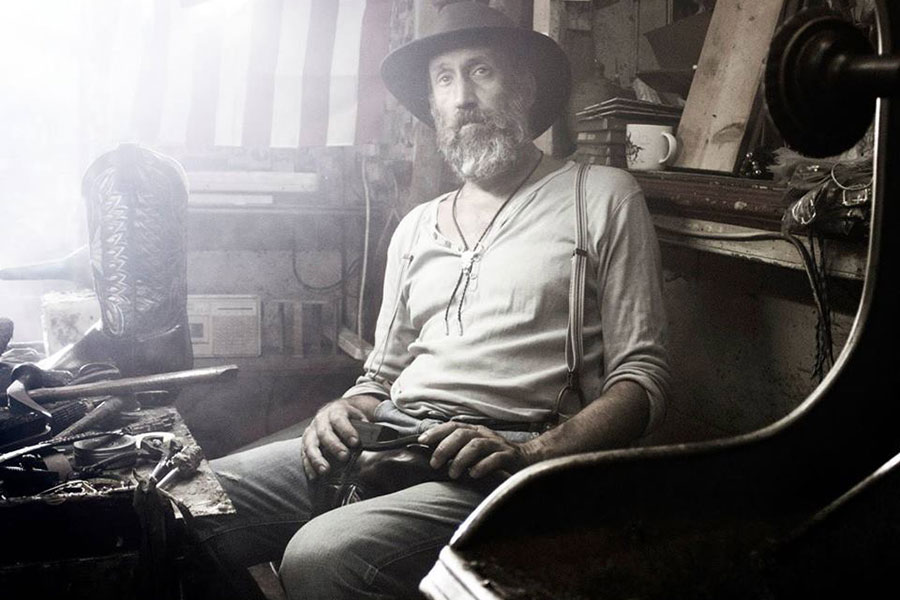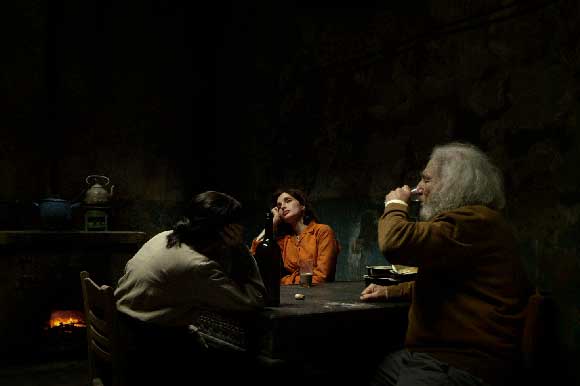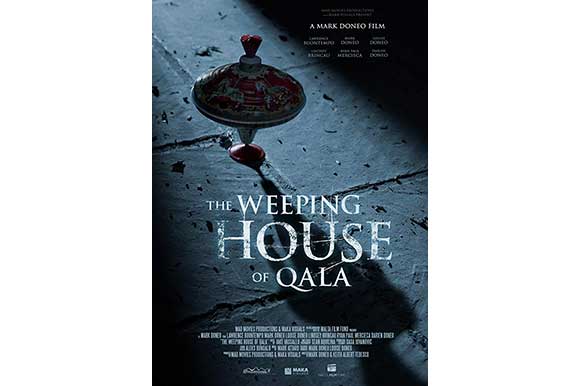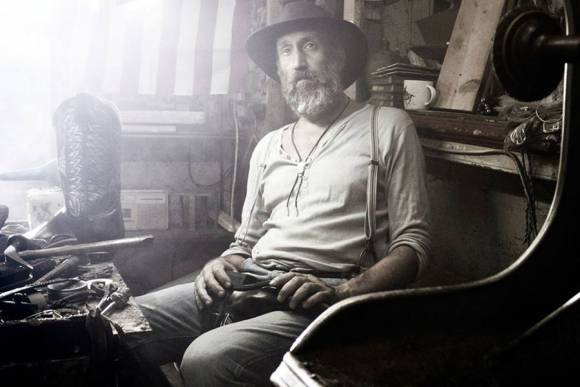PRODUCTION
The Malta Film Commission registered a healthy year for 2019. A total of 21 productions were serviced or produced on the island, leaving a total spend of 38,143,918 EUR. Moreover, the MFC’s annual report for the year stated that the commission hosted 68 recces from 12 countries over the twelve months.
The year kicked off with the filming of season two of the MTV-produced reality show True Love Or True Lies?, featuring eight couples in the ultimate deception and detection test. The film was serviced by Latina Pictures, spearheaded by local producer Winston Azzopardi. Latina had a busy year, also servicing the TV series Bulletproof for SKY UK; season two of Das Boot; a Dutch feature film, Sea of Time; and the Terence Malick film The Last Planet, starring Géza Röhrig as Jesus Christ, Mark Rylance as Satan, Matthias Schoenaerts as Saint Peter, Ben Kingsley and Joseph Fiennes.
Halo Pictures Ltd, the production company headed by former film commissioner Engelbert Grech, also had a busy year in 2019, servicing the Italian production Tolo Tolo; as well as Raft, which tells the story of a group of four youngsters who decide to build a raft and sail to the championship final in Cyprus.
 The German television film, Hartwig Seeler - Ein neues Leben, directed by Johannes Fabrick, shot on the island towards the latter half of the year, serviced by local production company Small Island Films. The film stars Emily Cox and Lasse Myr, as well as Matthias Koeberlin, who plays a private detective, travelling to Malta’s sister island of Gozo for a new case.
The German television film, Hartwig Seeler - Ein neues Leben, directed by Johannes Fabrick, shot on the island towards the latter half of the year, serviced by local production company Small Island Films. The film stars Emily Cox and Lasse Myr, as well as Matthias Koeberlin, who plays a private detective, travelling to Malta’s sister island of Gozo for a new case.
Moreover, Good Shepherd directed by the famed auteur Roland Joffe, also made its way to the island, shooting across a variety of locations from December to the beginning of 2020. Serviced by Pellikola Ltd, the film is an alternative retelling of the death of Jesus.
In November, preparations started on the TV series Cargo directed by Matti Kinnunen and produced by Kirsi Hatara and Rea Dominci, under the production company FremantleMedia Finland Oy. Malta features in the first three episodes of the eight-episode drama series, doubling up as Eritrea, Libya and Italy. The series, which tells a story about international human smuggling and a group of people who experience it first-hand, was serviced in Malta by Twenty13 Productions.
The Maltese/Canadian coproduction Carmen directed by Valerie Buhagiar shot across the island in the first half of the year. Led by Falkun Films – consisting of Maltese producers Pierre Ellul and Anika Psaila Savona – the film was made in conjunction with Canadian producer Coral Aiken of Aiken Heart Films. Carmen stars Natascha McElhone as a woman who finds love, and life, anew at 50, in a Maltese village in the 1980s. The film benefited from the Malta Film Fund, the Malta Co-Production Fund and the Malta Cash Rebate.
Harvey Keitel and Malcolm McDowell starred in the Maltese film Just Noise / Storbju by Italian director Davide Ferrario, the first local feature film inspired by the Sette Giugno riots of 1919. Filming commenced in October and the Maltese cast included Godwin Scerri, Ryan Debattista, Jane Marshall, Narcy Calamatta, Marc Caboudain, Peter Galea, Jesmond Mizzi and Erica Muscat. The film was produced by Aaron Briffa, Pedja Miletic and Jean Pierre Magro, who also wrote the script.
The neo-realist Maltese feature film Vanishing Wake, directed by Alex Camilleri and produced by Fishers of Men Ltd, wrapped production in November, having shot for five weeks. The story centres around Jesmark, a young Maltese fisherman, who is facing dwindling harvests, cutthroat competition, and a corrupt marketplace. When he and his girlfriend Denise learn that their newborn son is struggling to grow, Jesmark will have to abandon tradition in order to survive. In December, the film was accepted to the Les Arcs Film Festival as a work-in-progress.
In the meantime, two local production companies finished filming on their mini-series: Take Two wrapped shooting on a mini-series titled Merjen, while Shadeena Ltd, co-developed and coproduced the mini-series Storja ta' Storja with Sajjetta Ltd, for the National Book Council Malta. This consisted of eight episodes, produced over a period of nine months.
Moreover, the latter company also closed development on an adaptation of the Alex Vella Gera novel Is-Sriep Regghu Saru Velenuzi, winning the National Book Council Malta's first-ever feature film production grant in the process. A National Book Prize holder, the novel is an exploration of the repercussions of the violence which engulfed Malta in the ‘70s and ‘80s, a period of unrest which still reverberates in Malta’s contemporary politics and society.
Stargate Studios Malta offers visual effects and production services to the local and international film and television industries. In 2019 they completed VFX work on twelve productions, including the Italian television series I Medici (Season 3), Devils (Season 1), Ficarra & Picone's Christmas feature 'Il Primo Natale', as well as the American series Treadstone (Season 1). The company also officially moved into their new 850 sqm facility in 2019, which boasts a 50-seat screening theatre; a shooting stage; a vfx artist's pit, an audio mixing room with a dedicated recording booth; as well as 4K edit suites.
Faith Films, a company fully owned by The Bigger Picture Ltd, provided production services for the Italian film Isola Delle Rose.
Furthermore, a new corporate identity for the Malta Film Studios was launched in 2019. The site, which has been operational for 54 years, boasts Malta’s famous water tanks – consisting of one indoor tank and two large exterior water tanks situated along the coast and enjoying a natural horizon – is also being upgraded to accommodate more shoots, and to offer a broad range of production-related services. An investment of 2 million EUR in the site was also announced by the Minister for Tourism.
DISTRIBUTION AND FESTIVALS
 Take Two screened the feature film Limestone Cowboy directed by Abigail Mallia in local cinemas, as well as in selected venues abroad. The film tells the story of Karist, who believes he is ‘The Limestone Cowboy’ - a heroic protagonist from a tale told by his late father. Taking on the mantle of this hero, Karist runs for office to save his country, becoming a national celebrity. Among other developments, the company also presented their mini-series Holy Mary! / Miraklu at Serie Series in Fontainebleau, France, signing to Swedish sales agents Eccho Rights in the same year.
Take Two screened the feature film Limestone Cowboy directed by Abigail Mallia in local cinemas, as well as in selected venues abroad. The film tells the story of Karist, who believes he is ‘The Limestone Cowboy’ - a heroic protagonist from a tale told by his late father. Taking on the mantle of this hero, Karist runs for office to save his country, becoming a national celebrity. Among other developments, the company also presented their mini-series Holy Mary! / Miraklu at Serie Series in Fontainebleau, France, signing to Swedish sales agents Eccho Rights in the same year.
Moreover, Arts Council Malta’s New York office - set up in 2016 and part of the EUNIC New York cluster - coordinated Malta’s participation in the Panorama Europe Film Festival, Museum of Moving Image (MOMI), Queens, New York, for the premiere screening of Limestone Cowboy, with actors Paul Portelli & Davide Tucci attending.
Peter Sant’s debut feature Of Time and the Sea / Bahar Zmien, produced with the support of the Malta Film Fund, was distributed in Malta, and screened at the VFF 2019. The film, which was produced by Peter Sant and Hereonin, tells the story of a crippled King whose kingdom has crumbled and who lives in a mould infested bunker with his two daughters. They reside on an isolated island in the wake of a bizarre malady of mysterious origin. Written by Peter Sant and Alex Vella Gera, the film stars Ruth Borg, Narcy Calamatta and Mandy Mifsud. The film originally premiered at FIDMarseille in (2018).
Marc Doneo’s psychological thriller The Weeping House of Qala was also released on the 20 September 2019. The film, co-directed together with Keith Albert Tedesco, and produced by Mad Movies Productions and Maka Visuals, was supported by the Malta Film Fund. The story tells of a haunted mansion in the town of Qala, in Gozo, where a Maltese film crew arrives to shoot a documentary.
From Malta to Oblivion, a SwedishMaltese/Norwegian coproduction directed by Axel Petersen, got selected for the Berlinale Coproduction Market, 2019. The film is produced by Fedra (Norway) and coproduced by Pellikola (Malta) and Flybridge (Sweden). It is set to begin shooting in 2021.
The Valletta Film Festival (VFF) went into its fifth year running, with Béla Tarr as a special guest – and designated as the festival’s Master of Cinema 2019 - delivering a rare Masterclass on film directing. The festival was one of the first worldwide to show Cannes new releases, including The Traitor by Marco Bellocchio, Portrait of a Lady on Fire by Celine Sciamma, and The Whistlers by Corneliu Porumboiu. The festival also featured a new competitive section, the Cinema of Small Nations, in which it sought to shine a spotlight on the innovative work being done by filmmakers from small countries.
In 2019, the Film Grain Foundation – organisers of the VFF – also established its Valletta Film Lab, a training and development platform open to filmmakers from Malta and other small nations around Europe, with the main aim of helping filmmakers develop their feature length projects – fiction or documentaries. Two workshops were held, one in March and the second, on fiction script development, in December.
On the short film front, the 15th edition of Kinemastik’s Short Film Festival (KISFF) delivered innovative filmmaking in the idiosyncratic surroundings of the Msida Garden of Rest. On the main screen of KISFF, a selection of 18 films from 13 different countries were screened in competition, showcasing international festival winners from Berlinale, Cannes, Venice, Visions du Reel and Clermont Ferrand, as well as from emerging and local filmmakers.
The year 2019 also saw the first edition of Summer Cinema, consisting of open-air screenings, which included Kolya directed by Jan Sverak; Romeo and Juliet by Franco Zeffirelli; Il Postino by Michael Radford; My Life as a Zucchini by Claude Barras; and Ernest and Celestine by Benjamin Renner, Vincent Patar and Stéphane Aubier. The project was supported by the Malta Council for Voluntary Organisation through the Voluntary Organisations Project Scheme.
 The Malta Short Film Festival, organised by the Malta Film Foundation, continued its run on the public broadcaster PBS in the first few months of 2019, bringing together short films from across the world, with an evaluation panel dissecting their aesthetic qualities. The final programme consisted of an awards-giving ceremony in September. The festival was endorsed by the EFFE Label.
The Malta Short Film Festival, organised by the Malta Film Foundation, continued its run on the public broadcaster PBS in the first few months of 2019, bringing together short films from across the world, with an evaluation panel dissecting their aesthetic qualities. The final programme consisted of an awards-giving ceremony in September. The festival was endorsed by the EFFE Label.
The Malta Youth Film Festival was also organised to showcase films from Malta’s younger generations. There were fourteen entries to the competition, with the winner announced on 31 May: Shaun Vella’s Mument Misruq won the awards for Best Storytelling, Best Audience Engagement and Best Picture.
And, finally, during the last week of November the Golden Knight Malta International Short Film Festival, organised by Malta Cine-Circle, showcased original work by non-professionals and film school students from across the globe, aiming to encourage further enthusiasm and development in the sector. Five films – from the UK, New Zealand, Iran, Ireland and the USA - received the Golden Knight Award.
EDUCATION
The Master of Arts (M.A) in Film Studies at the University of Malta continued its successful run, with two short films produced by the end of 2019. These were Aldo Zammit’s Dream Big Little Cowboy, and Delfina directed by Mario Cordina. These were later screened during the 17th edition of Alice nella Città (17-27 October 2019), as part of the highly prestigious International Festa del Cinema / Rome Film Festival on Monday 21 October 2019. The students were mentored on set by the award-winning directors Silvia Luzi and Luca Bellino, as well as the acclaimed director of photography Olaf Hirschberg. Prof. Gloria Lauri-Lucente, co-ordinator of the M.A. in Film Studies, was the executive producer, on behalf of the University of Malta. Maria Evelyn Vella acted as delegate producer.
Arts Council Malta (ACM) oversaw various training initiatives, including creative skills development programmes targeting sectoral gaps, giving priority to scriptwriting for theatre and film, as well as technical and production skills, and critical reviewing. Through this initiative, eight new scripts were developed and read to the public.
Moreover, the arts centre Spazju Kreattiv organised a masterclass on film and television scriptwriting by Scottish scriptwriter John Collee, whose credits include Master and Commander: The Far Side of the World or Happy Feet.
GRANTS, LEGISLATION AND ASSOCIATIONS
In 2019, the Maltese government upgraded the cash rebates for filmmakers from 27 percent to a maximum of 40 percent of cash back on eligible expenses. The Malta Film Fund – the island’s main source of financing for indigenous film – raised its funding to 600,000 EUR and had two main calls, one in May, and the second in September. The first call had 18 applications, of which eight were accepted; the second call had seven application, of which two were accepted.
The beneficiaries of the Malta Film Fund in 2019 included: Mario Philip Azzopardi, applying under Citadella Films Malta Ltd, for L-Ispettur Bonnici (writer’s grant); Sajjetta Ltd for Big Silver (development grant); Larissa Bonaci, applying with Pinch Media Film Ltd (UK), for Christina: The Star of Malta (short film production); Christian Kotey/Clare Cahill with God's Whisper (short film production); Paul Parker  Films Ltd for The Obscure Life of the Grand Duke of Corsica (production fund) as well as for God's Soldiers: Malta Siege (production fund); Monolith Productions for Storbju (production fund) and Joseph Vassallo, under the auspices of Croalta Ltd, for The Janitor (production fund).
Films Ltd for The Obscure Life of the Grand Duke of Corsica (production fund) as well as for God's Soldiers: Malta Siege (production fund); Monolith Productions for Storbju (production fund) and Joseph Vassallo, under the auspices of Croalta Ltd, for The Janitor (production fund).
In the meantime, the National Book Council (NBC) launched the first call for applications for the NBC Film Adaptation Fund, offering 200,000 EUR in support for the development and productions of a film which adapts a National Book Prize winner. Martin Bonnici’s adaptation of Alex Vela Gera's novel Is-Sriep Regghu Saru Velenuzi was awarded the coveted fund for 2019.
Kultura TV, the ACM’s television development and production grant, aiming to incentivise the development of cultural and creative content on private broadcasting stations, issued a call closing in July 2019. The results came out in August, awarding seven beneficiaries with a cumulative total of 200,000 EUR for a variety of audio-visual work ranging from drama to documentary.
The Malta Producer’s Association, which represents the majority of film & TV producers in Malta and which was established in 2018, continued its lobbying for a change across the island’s film servicing and indigenous sectors. Throughout 2019, its interim executive committee focused on establishing its roots and its presence within the media, both local and international, as well as on expanding its member database and putting pressure on various authorities to ensure a level playing field and transparency in the sector.
CINEMA ATTENDANCE
In 2019, the six cinemas in Malta and Gozo, which operate 28 screens, cumulatively screened 409 different film titles, welcoming 748,568 admissions over the 12 months and earning a total revenue of 5,051,000 EUR. An average of 71 screenings per film – or 29,184 total film screenings over the 12 months, across all venues – were recorded by the National Statistics Office.
Of these, Maltese productions boasted 13,942 admissions with a total gross box office of 99,000 EUR over 650 screenings. Foreign productions welcomed 734,626 admissions with a total gross box office of 4.952 EUR million over 28,534 screenings, with most cinemagoers watching American titles (91.2 per cent) while Maltese productions only attracted 1.9 per cent of total admissions. European titles accounted for only 5.87 per cent of foreign film admissions. The most popular films were The Lion King, Aladdin and Joker, attracting 10.4 per cent, 7.2 per cent and 5.5 per cent of the total admissions respectively.

Figure 1: Source: National Statistics Office (NSO), Malta
In terms of film type, 238 fiction non-animated films were screened in Malta and Gozo, accounting for 72 per cent of total admissions; 47 animated films and 48 documentary titles were also screened over the 12 months, accounting for 26.4 per cent and 0.7 per cent of total admissions respectively. Moreover, 81 per cent of admissions were for digital non-3D titles, while admissions to 3D films accounted for 18 per cent of the total amount of admissions.
Most films shown in Malta were rated 15 (26.9 per cent) or 12A (25.9 per cent) while only 3.4 per cent were rated 18. Employment in Maltese cinemas was mainly part-time: 77.6 per cent of all employees fell under this category, while the venues were found to be employing an average of 134 staff members.
TV
Malta’s broadcasting sector is dominated by three main stations: the public broadcaster, with its stations TVM and TVM2; and two channels, ONE television and NET TV, owned by Malta’s main political parties, as well as a myriad of smaller, private stations. Three of these latter possess a General Interest Objectives licence (Smash TV, f Living, Xejk), with the remaining two (iTV, Owners’ Best) being teleshopping channels. The island also broadcasts numerous foreign stations (principally Italian), as well as cable television, through private telecommunications suppliers. The national regulators are the Malta Broadcasting Authority for content and the Malta Communications Authority for matters related to transmission and the service providers.
The reports issued by the Broadcasting Authority for the year 2019 shows a shift in audience numbers across the twelve months. In March 2019, the most common service for watching television was that of paid subscriptions, at 90.4 per cent, followed by IT-based systems (51 per cent), such as Netflix (8.5 per cent), IPTV (15.5 per cent) and Android (13.7 per cent), with free-to-air services coming in at 3.6 per cent. By November 2019 these numbers had changed slightly: paid subscriptions accounted for 92.1 per cent of audiences; IT-based for 23 per cent (Netflix, 8.7 per cent; IPTV 4.9 per cent and Android 3.9 per cent); while free-to-air accounted for 3.9 per cent.



Figure 2: TV Reception Services; March, July & November 2019. Source: Broadcasting Authority, Malta
The most followed TV stations in Malta in 2019 were TVM (33.35 per cent in March; 34.79 per cent in July and 33.9 per cent in November); ONE television (18.41 per cent in March; 20.12 per cent in July; and 17.9 per cent in November); and NET TV (7.88 per cent in March; 7.96 per cent in July and 10.09 per cent in November.)
The most popular genres were sports (8.6 per cent in March; 8.5 per cent in July; and 8.8 per cent in November); light entertainment (7.9 per cent in March; 7.4 per cent in July; and 7.6 per cent in November); and music videos (7.7 per cent in March; 6.8 per cent in July; and 7.1 per cent in November).
CONTACTS:
MALTA FILM COMMISSION
Malta Film Studios
Kalkara, KKR 9062 Malta
+356 2180 9135
This email address is being protected from spambots. You need JavaScript enabled to view it.
This email address is being protected from spambots. You need JavaScript enabled to view it.
ARTS COUNCIL MALTA
TG Complex Suite 1, Level 1
Brewery Street
Mriehel BKR 3000
Telephone (General): + 356 2334 7201/02
Email (Brokerage): This email address is being protected from spambots. You need JavaScript enabled to view it.
Email (General): This email address is being protected from spambots. You need JavaScript enabled to view it.
Sources: National Statistics Office; Shadeena Ltd; Broadcasting Authority; Malta Film Commission; Malta Producer’s Association; Stargate Studios; Arts Council Malta; Film Grain Foundation; Kinemastik Film Festival; University of Malta’s MA Film Studies; Facebook page; Latina Pictures; Falkun Films; Small Island Films; Twenty13 Productions; Halo Pictures Ltd, Malta Youth Film Festival; Pellikola ltd; Agenzija Zaghzagh;




















